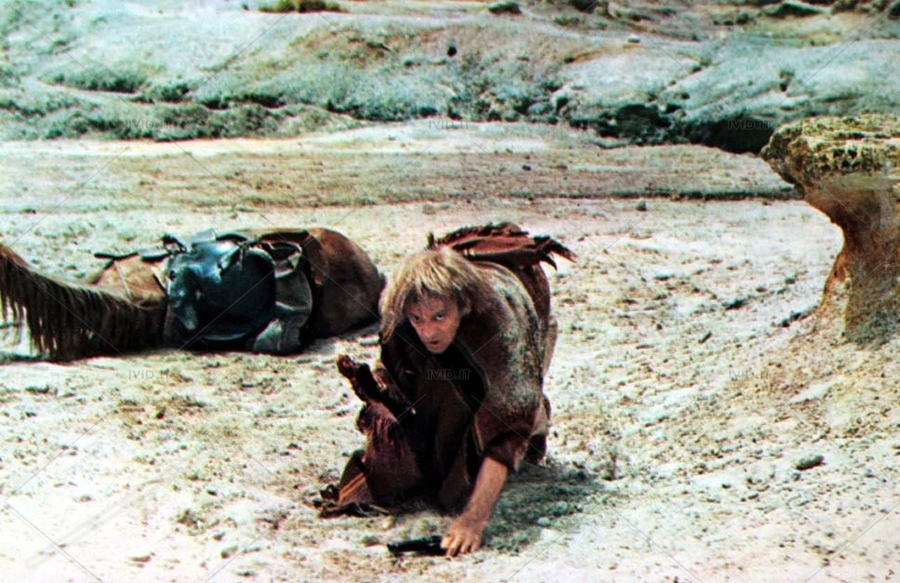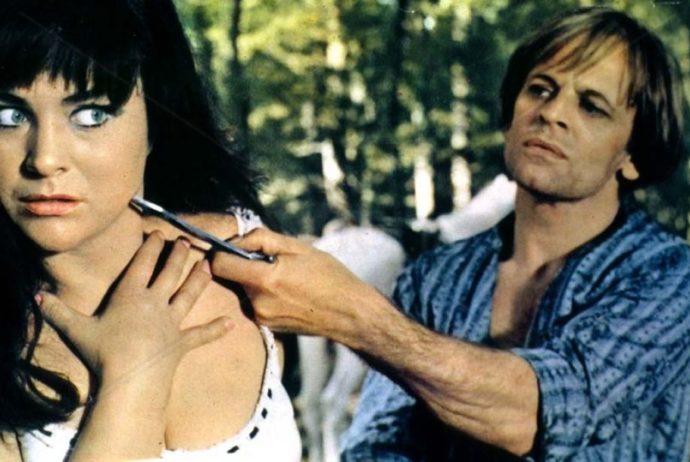Dir: Mario Costa
Star: Klaus Kinski, Gabriella Giorgelli, Giuseppe Cardillo, Paolo Casella
a.k.a La Belva and Rough Justice
It’s nice to see Kinski allowed to let rip fully on a character now and again. Werner Herzog was particularly good at allowing this, and the results were usually incandescent. This isn’t quite at those levels, but is still one of the more memorable spaghetti Westerns in which Klaus appeared. He plays Johnny Laster, a sex-maniac who will paw any woman within range, especially when he has had a bit to drink. This is apparent, right from the start, where he tries to assault a particularly… bosomy young woman, washing her clothes in a river. Only the fortunate presence of someone with a larger gun than Johnny’s, saves her from a fate worse than death.
In town, he teams up with a local ne’er-do-well, and they hatch a plan to rob popular local businessman, Mr. Powers. The plan leaves Powers dead, but the thieves come up empty. Laster, after disposing of his accomplice, gets involved with another area hoodlum, Glen (Casella), who clearly wasn’t aware of what happened to the last accomplice. He has come up with a rather more convoluted plan to get their hands on Powers’ money:
 Abduct Powers’ daughter, Nancy, who is on the way to town to claim her inheritance, and get someone to take her place
Abduct Powers’ daughter, Nancy, who is on the way to town to claim her inheritance, and get someone to take her place- ?????
- PROFIT
Okay, it’s slightly better thought-out than that, though not by much. His idea isn’t bad: it’s more the execution, because the stand-in could not look less like Nancy Powers if she tried. This is what happens when your chosen replacement for the thoroughly blonde daughter of old money is Juanita (Giorgelli), a Mexican go-go dancer – or, at least, the 19th-century version thereof. Remarkably, it seems to work, at least to begin with. For no-one in the town has met the daughter, and Powers’s minion, Pinkerton, who has at least seen a portrait of her, initially writes off the difference between Nancy and Juanita as bad art.
Even more ill-conceived is the other part of the plan, which involves leaving Laster to “guard” Nancy. [Glen really needs to do a better background check on the partners in his criminal endeavors…] It doesn’t take long before he’s moving in on her, like a shark that scents blood. Things escalate from there, and although the conspirators get a chunk of cash, both Nancy and Pinkerton end up dead. Except Pinkerton isn’t quite dead, and identifies everyone to the authorities. The gang splits up, with a price on their heads, and local Mexican gang leader Machete (any Robert Rodriguez fans will understand why I hooted on hearing that name) sees an opportunity to claim the reward. His men track down Laster who, like the craven coward he is, agrees to finger the rest of the gang and the loot, if his life is spared.
I’m pleased to report this doesn’t end well for him. I’m slightly less pleased that it doesn’t end too well for anyone else either – in particular Juanita and her lover Ricardo (Cardillo). They were fairly sympathetic characters, who just wanted a bit of cash, so they could escape their life of drudgery, and didn’t quite realize what they were getting into, by aligning themselves with Laster. Once again, folks: we see the importance of doing thorough background checks. It does feel as though Costa ran out of ideas as to where the plot should go for the final reel, eventually throwing up his hands and ordering a bulk package from “Gunfights In Rock Quarries R Us”.
To that point, however, this has generally been reasonably watchable, with a brisk pace and plot that twists in interesting ways. The sheer “loose cannon-ness” of Laster is fascinating to see, since you’re never quite sure what he’s going to do next. Though if you bet on something sleazy, you’ll likely come out of the movie ahead with your bookie. It’s notable to see Kinski play a character who is basically close to irredeemable, and lives up to the nickname “Crazy Johnny.” The sex-maniac angle is particularly notable and one wonders how much Kinski’s torrid personal life played into it. Was the character of Laster written specifically for him? Regardless, it seems so close to home I’m surprised Klaus took it on. It’s almost like O.J. Simpson playing the part of a wife murderer.
I would like to have seen him more in the middle section of the film: he’s somewhat shunted off to one side for the cutesy stuff between Juanita and Ricardo, and the “unconvincing stand-in” section of the plot. Similarly, the sudden arrival of and focus on Machete in the second half, after he has only been mentioned briefly to that point, is slightly jarring. The rest of the cas5 are so bland as to be almost forgettable, with none of them making any real impact, and the same goes for Costa’s direction: his skills seem more skewed towards the script-writing. This was the final movie on which Costa would work, and appears to have seen him come out of retirement, as the rest of his 33 directorial credits were all between 1945 and 1965.
There is one name of note who worked on the film beyond Kinski. The soundtrack is an early one by Stelvio Cipriani, whose IMDb entry lists over 200 movie credits as composer, including a remarkable eighteen in a single year (1978: I can only presume some were partial credit, unless he was truly capable of churning out a full score every 20 days!). These are mostly Italian, but some of his music has been used elsewhere, e.g. in the Death Proof section of the Grindhouse double-feature, so it appears Quentin Tarantino is a fan. All told, it’s a solid enough entry, but one where Kinski’s performance is probably the only factor which will stick in your brain. Even with the very strange dubbing in the English-language version, which has Klaus given a bizarre Southern drawl because… reasons, his animal-like intensity still shines through. It’s worth a look, purely for that alone.

